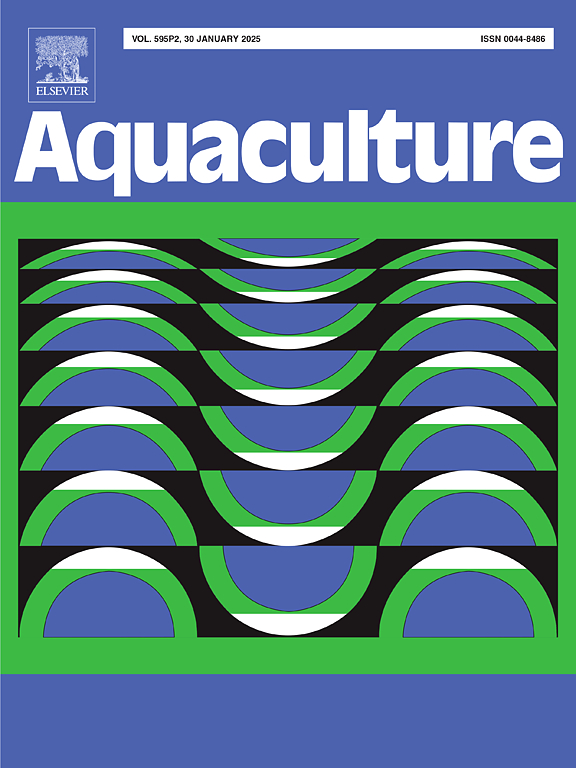Early-life Bacillus circulans L38 intervention enhances growth and intestinal health in large yellow croaker (Larimichthys crocea) larvae
IF 3.9
1区 农林科学
Q1 FISHERIES
引用次数: 0
Abstract
The early life stage is often regarded as a “window of opportunity” for microbial colonization. Targeted intervening with probiotics during this period may be a beneficial approach to foster the healthy development of larvae. Consequently, the aim of this study was to evaluate the impact of supplemental Bacillus circulans L38 (BC) on survival, growth performance, and intestinal health of large yellow croaker larvae. The larvae were fed diets containing different concentrations of BC (0 CFU/g, 106 CFU/g, 107 CFU/g, and 108 CFU/g) for 30 days. Results demonstrated that larvae fed the diet with 108 CFU/g BC significantly enhanced growth performance (P < 0.05). Concurrently, larvae fed the diet containing 108 CFU/g BC significantly promoted intestinal development by increasing intestinal fold height, enhancing expression of markers related to intestinal epithelial cell proliferation and apical junction complex, and boosting brush border enzyme activity (P < 0.05). Furthermore, larvae fed a diet containing 108 CFU/g BC exhibited a significant enhancement in both the activity and expression levels of digestive and absorption-related enzymes and genes (P < 0.05). Supplementation with 108 CFU/g BC further enhanced the larval antioxidant capacity, likely by modulating both the activity and expression of antioxidant connected to enzymes and genes (P < 0.05). Additionally, supplementation with 107–108 CFU/g BC can alter the activity of enzymes connected to innate immunity and modulate the expression levels of genes involved in inflammatory response, thereby enhancing the immunity of larvae (P < 0.05). Meanwhile, larvae fed a diet containing 108 CFU/g BC maintained healthy intestinal microecology by regulating microbial diversity and boosting the proportion of health-promoting bacteria (P < 0.05). In conclusion, supplementation with 108 CFU/g BC could improve the growth performance and intestinal health of large yellow croaker larvae. This improvement are attributed to the promotion of intestinal development, improvement of digestive and absorptive capacity, augmentation of antioxidant capacity, bolstering of immune function, and optimization of the gut microbiota diversity and composition.
早期循环芽孢杆菌L38干预对大黄鱼(Larimichthys crocea)幼虫生长和肠道健康的影响
生命早期阶段通常被认为是微生物定植的“机会之窗”。在此期间有针对性地使用益生菌干预可能是促进幼虫健康发育的有益方法。因此,本试验旨在评价在饲料中添加环状芽孢杆菌L38 (BC)对大黄鱼幼虫的存活、生长性能和肠道健康的影响。分别饲喂不同浓度BC (0 CFU/g、106 CFU/g、107 CFU/g、108 CFU/g)的饲料30 d。结果表明,饲粮添加108 CFU/g BC可显著提高幼虫的生长性能(P <;0.05)。同时,饲粮中添加108 CFU/g BC显著促进了肠道发育,增加了肠道褶皱高度,提高了肠上皮细胞增殖和顶端连接复合体相关标志物的表达,提高了刷边酶活性(P <;0.05)。此外,饲粮中添加108 CFU/g BC显著提高了幼虫消化吸收相关酶和基因的活性和表达水平(P <;0.05)。添加108 CFU/g BC进一步增强了幼虫的抗氧化能力,可能是通过调节与酶和基因相关的抗氧化剂的活性和表达(P <;0.05)。此外,添加107-108 CFU/g BC可以改变与先天免疫相关的酶的活性,调节炎症反应相关基因的表达水平,从而增强幼虫的免疫力(P <;0.05)。同时,饲粮中添加108 CFU/g BC的幼虫通过调节肠道微生物多样性和提高促健康菌的比例(P <;0.05)。综上所述,添加108 CFU/g BC可改善大黄鱼幼虫的生长性能和肠道健康。这种改善可归因于促进肠道发育,改善消化吸收能力,增强抗氧化能力,增强免疫功能,优化肠道微生物群多样性和组成。
本文章由计算机程序翻译,如有差异,请以英文原文为准。
求助全文
约1分钟内获得全文
求助全文
来源期刊

Aquaculture
农林科学-海洋与淡水生物学
CiteScore
8.60
自引率
17.80%
发文量
1246
审稿时长
56 days
期刊介绍:
Aquaculture is an international journal for the exploration, improvement and management of all freshwater and marine food resources. It publishes novel and innovative research of world-wide interest on farming of aquatic organisms, which includes finfish, mollusks, crustaceans and aquatic plants for human consumption. Research on ornamentals is not a focus of the Journal. Aquaculture only publishes papers with a clear relevance to improving aquaculture practices or a potential application.
 求助内容:
求助内容: 应助结果提醒方式:
应助结果提醒方式:


